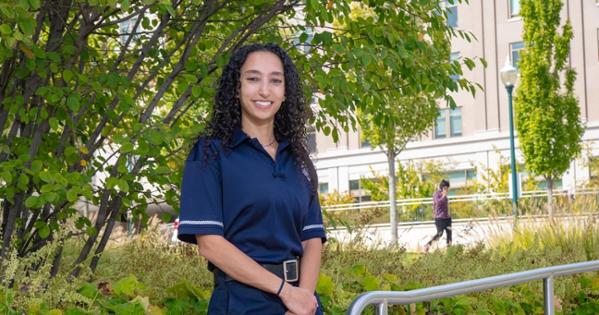Protect and Serve Better

The American University Police Department has reached an important milestone in its efforts to reflect the campus community it serves.
Last year, AU joined the 30x30 Initiative, a national campaign launched in 2018 that seeks to increase the number of women in policing. The university is among about 330 law enforcement agencies across the country that have pledged to ensure that at least 30 percent of sworn officers are women by the year 2030.
AUPD has since exceeded that goal, with women making up about 40 percent of its approximately 35 sworn officers.
“We are committed to ensuring our police force is reflective of the diverse community it serves, and we are proud of the progress we continue to make to ensure women are well represented among the ranks of our officers,” said Bronté Burleigh-Jones, Kogod/BS ’91, MBA ’93, CFO, vice president and treasurer.
Added Phil Morse, assistant vice president of University Police and Emergency Management: “When the community looks at us, they see themselves, and that makes for better community relations and community policing.”
Recent research suggests women officers—who currently make up 12 percent of sworn officers and 3 percent of police leadership nationally, according to the 30x30 Initiative—are perceived by communities as being more honest and compassionate. They use less excessive force and are named in fewer complaints. Women officers also see better outcomes for crime victims, especially in sexual assault cases, and make fewer discretionary arrests, including of non-White residents.
AUPD detective Amanda Kaja CAS-SPA/BA ’13, SPA/MS ’16, a Muslim woman who grew up in New York City, decided she wanted to go into law enforcement after 9/11 to serve her community.
Kaja, who interacted with officers of all backgrounds as a child in the Big Apple, found her own background made a real difference at AU commencement in May while working with a graduate’s security team that primarily spoke Arabic.
After the security team struggled to communicate in English, Kaja switched to Arabic, a language she grew up speaking at home. That helped ease communication and made the guests feel more comfortable throughout the day.
“It was rewarding because we all don’t fit in just one category. I’m not just a woman. I’m not just Muslim,” she said. “When you try to have a more diverse group, you’re increasing the groups within, so you can better connect with people.”
But increasing the representation of women in policing benefits more than constituents. It also impacts the future recruitment and retention of officers. At AUPD, women hold leadership positions at sergeant, lieutenant, and captain. Officer Lawanda Hermonstine, who has worked for AUPD eight years, said that having women in leadership positions signals to female recruits that the organization is one where they can advance and grow their careers.
“Looking at them climb that ladder, it gives you a sense that if she can do it, I can do it,” said Hermonstine, who patrols campus overnight. “If you’ve got this, I’ve got this.”
Morse said taking part in the 30x30 Initiative is part of an AUPD-wide goal to foster a culture of diversity, equity, and inclusion—one of the cornerstones of the AU experience.
“30x30 is a significant program nationally, and I’m glad they did it,” Morse said. “For us at AUPD, it’s just another tool in the toolkit making us a better organization to serve our community.”
